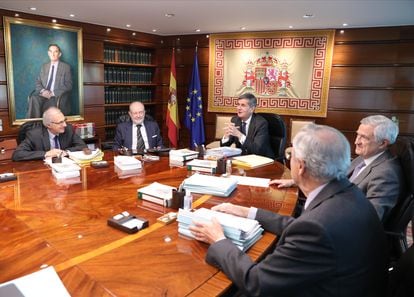Plenary of the Constitutional, in December 2021. Isabel Infantes (Europa Press)
The Constitutional Court has decided to apply a grounded strategy in the face of the tensions that continue to accompany the debate on the renewal of this and other State institutions.
This strategy involves keeping in a drawer, for an indefinite time (at least, until the court is renewed in its composition), the resources related to the most controversial matters that are pending judgment.
Among them, four are especially controversial: the abortion law, the educational reform of the
Celáa law,
the euthanasia law and the prohibition that the General Council of the Judiciary (CGPJ) make appointments while it is in office.
None of these issues will be brought to the plenary session shortly, by virtue of an agreement established between the conservative sectors (six magistrates) and progressive sectors (five) of the Constitutional Court.
Sources from both blocks explain that they want to avoid the risk of incurring again in a dynamic of confrontations that discredits the court.
Especially considering that the mandate of the Constitutional Court with its current composition, with a conservative majority, ended on June 12.
Four of its magistrates must be replaced: two at the proposal of the Government and two of the CGPJ, but the resistance of the PP to agree on the renewal of the CGPJ itself has consequently blocked the Constitutional Court.
The case of the abortion law is paradigmatic: the dominant bloc, from the conservative sector (and one of whose magistrates is responsible for the presentation), considers that this is not the time to issue a ruling that would open the court up again, even although it ended up endorsing the current law of deadlines.
The division would be inevitable, in any case, because the progressive sector would flatly refuse to accept that the guarantee of the terms be compensated with precautionary clauses that would limit or condition in some way the free will of women, for example through the regulation a period of reflection before aborting.
The sentence that was issued, therefore, would fracture the court again with a predictably tight result.
Both sectors have reached the conclusion that it is better for the appeal to be resolved by the next court, already renewed, where the ruling may have at least eight or nine votes in favor.
The strategy of avoiding the clash has been promoted by an alliance between the president of the court, Pedro González-Trevijano, and the vice president, Juan Antonio Xiol, from the conservative and progressive sectors, respectively.
This alliance has been very clear in the last plenary sessions.
Take two examples of this.
Xiol is the rapporteur of a controversial sentence on the constitutionality of article 92.7 of the Civil Code, which foresees prohibiting shared custody for those investigated for domestic or gender violence.
Xiol's draft sentence (and the rest of the progressive magistrates) proposed endorsing said precept.
But, starting the debate, there were several interventions by magistrates from the conservative sector in favor of annulling said rule.
The swords were raised again: another division in the making, and the court in a possible situation of returning joint custody to those investigated for abuse.
The train crash was avoided by Trevijano, who proposed to avoid the fracture by rejecting the question of unconstitutionality alleging procedural and formal reasons, but without going into the substance of the matter.
This allowed consensus to be recovered, at the price of leaving the substantive debate pending resolution: the questioned precept is still in force, without the court ruling on whether it is constitutional or unconstitutional.
You will be able to do it in the future, once it has been renewed, because there is another similar case pending judgment.
Xiol, for his part, joined his vote with that of the conservative sector in the latest Constitutional ruling that dismantled – as it had done on previous occasions – the Government's legal strategy against the state of alarm.
What was debated in this new resolution was whether the executive power could submit, in advance, to the Judiciary specific proposals to limit rights, such as perimeter confinements or curfews.
The progressive sector opposed this new blow to the Government's anti-pandemic measures, but Xiol supported the conservative sector and the thesis that prospered was that government bodies must assume their own responsibility when they limit rights, without submitting their decisions to the prior endorsement of the courts.
The strategy of avoiding the most divisive issues has returned to work in court as a result of the debate on its renewal.
Last weekend, the magistrates' phones were smoking.
News was arriving that movements were taking place to encourage the Constitutional Court to issue a ruling on the appeals that the PP and Vox presented against the prohibition that the Council of the Judicial Power make appointments while it is in office.
If the court annulled said rule, the entire renewal process was unblocked.
The Constitutional Court, however, has decided that it will not speed up the resolution of the aforementioned appeals, whose rapporteurs are Juan Antonio Xiol and María Luisa Balaguer, both from the progressive sector.
The essential reason, according to court sources, is that such challenges coincide with the processing in the Courts of the legal reform proposed by the PSOE so that the Council of the Judicial Power recovers the power to appoint the two magistrates of the Constitutional Court that corresponds to it. designate now.
While the Parliament is processing the debate on matters related to an appeal pending resolution, it is the rule of the court - the sources consulted affirm - not to interfere in parliamentary work.
What the resources say
abortion.
The appeal of unconstitutionality of the PP against the abortion law, presented 12 years ago, maintains that this norm violates the balance between the rights of the unborn and those of the mother.
The challenge is based on the 1985 Constitutional ruling that spoke of the
nasciturus
(the unborn) as a "legally protected asset."
The court said that the rights of women cannot have "absolute primacy" over those of the unborn, except in the three cases marked by the previous law (rape, health of the mother or malformation of the fetus).
For this reason, according to the PP, the appealed law, which created a period of free abortion and without any explanation until the 14th week, violated the Constitutional doctrine.
'Law Celáa'.
The resources of the PP and Vox stated that the
Celáa law violates
the freedom of parents to choose the center in which they want their children to study and attacks Spanish, because it ceases to appear in the text as the vehicular language of education, by replacing this mention by a more generic expression.
The then popular leader, Pablo Casado, referred at that time to his party's appeal: "We are not going to allow our children to be used as a tool for a project of social engineering or nationalist transformation of some communities."
The axis of the resource is, in any case, the defense of the concerted school.
Euthanasia.
The PP and Vox appealed the euthanasia law based on the infringement of the right to life contained in article 15 of the Constitution and in article 2 of the European Convention on Human Rights, as well as the principle of legal certainty (art. 9.3 of the Constitution).
All this —argued the PP— “to the extent that the established regime fails to comply with the positive and negative duties of the State to protect life and, in particular, to establish a legal regime that guarantees that the decision has been made freely and with full understanding of what it entails”, as well as to “prevent potential abuses” and “protect vulnerable people”.
50% off
Exclusive content for subscribers
read without limits
subscribe
I'm already a subscriber







/cloudfront-eu-central-1.images.arcpublishing.com/prisa/OADNJHA33STDSSDCLLQNLNFBWQ.jpg)

